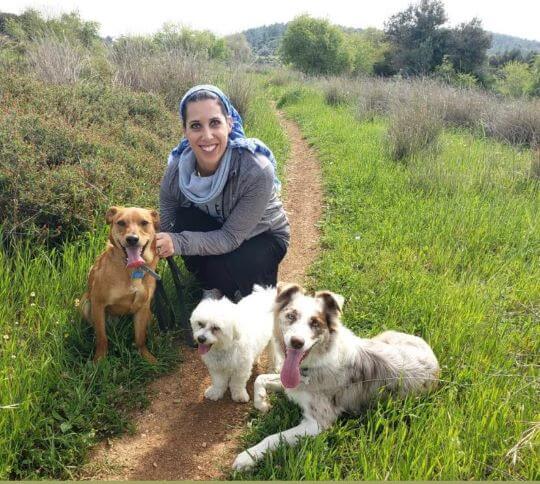
This Orthodox Jewish Woman Travels the World to Train Dogs
“I feel like I can speak dog,” Chomie Gross says. It’s a pretty shocking statement coming from someone who had a severe fear of canines for most of her life.
Now, Chomie, 34, is not only a dog lover, but trains them for a living. “I never saw this coming, and I never knew it would be something I’d be good at, but it’s so natural to me,” she shares. Often, Chomie can walk into a house where a dog is out of control, look at it and say a word, and the dog will lie down and be still. With her newfound talent, she feels like it’s her mission to let people know that both they and their dogs can be happy at the same time.
Native to Baltimore, Chomie, used to be so terrified of dogs, she would cross the street if she saw one coming. Eventually though, she married and had three kids — and as they grew, they begged her for a puppy. As nervous as she was, she didn’t want that anxiety to spread to her children and have them be scared of dogs so instead, decided to face her fears head on.
The family adopted an Australian Shepherd named Shelby and fell in love. Then, a little over two years ago, during the pandemic, her family decided to make aliyah along with Shelby. At the time, she owned a wig salon and bridal gown rental shop in Baltimore (which she still runs remotely from Israel). They had started training her in the United States, but Chomie felt that some of the elements of that regimen didn’t make sense. She began studying dog behavior and psychology — going all the way back to the Torah: What did G-d intend wolves and dogs to do? What is the basic biology and primal psychology, and how does it fit into human psychology? She dove into her research with an unexpected passion. Through that, she learned that balanced training is the method she connected to most and tried it out on Shelby. It worked and she became the go-to for dog training questions from neighbors and friends. She started training dogs in her new neighborhood, Ramat Beit Shemesh, and began charging for her services less than two years ago. Now, she travels all over Israel as a dog trainer — in addition to her bridal work— and she’s begun traveling to the States after many Instagram requests. Chomie’s page is highly educational, and she regularly uses it as an educational tool for dog owners.
Chomie’s Strategy
She uses balanced training methods which involve the use of both reward-based techniques and aversive consequences, while embracing canine psychology to diminish the dogs’ anxiety to improve behavior and quality of life. Her repertoire covers the full span of dog ages and stages — from puppies to late adulthood — although her specialty is “training the untrainable.” These are dogs who have already been through several trainers, been put on medication, and been considered for rehoming and even euthanization. While Israel is a no-kill zone, there are a number of dogs on what is colloquially called “death row” due to extreme dysfunction (often due to abuse) and perceived untrainability. Over a million shelter animals are euthanized yearly in the United States.
Chomie is a firm believer that any dog can be trained, and that training is integral to the individual happiness of the dog and its owner, as well as the joy of their relationship. “Before I leave someone’s house, I want them to literally be crying tears of joy and saying, I never thought this could be my dog! I want them to see a difference.”
Untrained (or rather, “untrainable”) dogs are often surrendered to the ASPCA because their owners were unprepared for the lifestyle those dogs require — such as the German Shepherd, who looks like an adorable puppy but needs more exercise than a twenty-minute walk a day. Other times these dogs received purely positive training as opposed to balanced training, and remain dysregulated. Animal activists will declare “death before discomfort” as a justification for euthanization and in defense of purely positive training. What this does not take into account is that dogs require command-based training as well as positive training, as balance is everything.
Misinformation regarding what is considered humane for dogs is based in that word: “human.” Dogs do not think like humans, and need different environments, behaviors, and boundaries from humans in order to feel comfortable. Dogs who need to be locked in rooms when guests come over or who pull at the leash or nip are deeply upset; they act out because they don’t know how to self-soothe. “However much your dog annoys you with its behavior, that dog is displaying extreme anxiety and stress,” Chomie explains. In such cases, the dog is the victim of the owner’s lack of knowledge, leadership, and training.
“Really, I train the owners and not the dogs — the dogs are never the problem,” she says, in response to human discomfort or reluctance to effectively relate to their dogs. Most people don’t understand the role that dogs have in the world — nor how wired that role is into canine psychology: “Dogs get out of control with purely positive training because dogs need leadership. G-d put them in this world to work, not to sit in our lap and look cute.” Chomie is adamant that the balanced methods she employs are responsible for keeping “untrainable dogs” alive, and that dogs who are trained in this way are truly living their best lives.
Another example about what dogs need vs what humans think they need is crate-training. Many believe it’s abusive, but in reality, it’s quite the opposite: dogs require a personal enclosed space in which to decompress and destress. Even working dogs (those who were originally bred to or have been trained to perform tasks) need to be placed in their crate several times a day in order to rest. While they might be high-energy and able to perform for extended periods of time, it is ultimately most healthy for them to return to their safe space after being stimulated… much like humans would prefer to listen to music or take a warm back after a long day, setting a boundary between outside-time and me-time.
People might claim that crating dogs is barbaric, but Chomie says that in her perspective, “a person who doesn’t put their dog in a dog crate is equivalent to a human putting a human in a dog crate.” We cannot assume that every creature wants to or needs to be treated the same way that we would prefer. Veahavta l’reiacha kamocha does not apply to animals, for one thing – yet for another, treating animals like people can be tzaar baalei chayim if that animal’s needs are not being met by extension.
The Emotional Side of Dog Training
In addition to projecting human needs onto dogs (leading to the refusal of leash or crate training), humans can unwittingly affect their dogs with their own emotions. “Your dog feeds off of you,” Chomie explains. Dogs are incredibly perceptive to human emotion, and will react accordingly. This can occur in a healthy manner. For example, when your dog is well-trained and balanced, the dog will respond sympathetically if you’re having a hard day. This is also why dogs can be fantastic service and support animals. Alternatively, a dog who is not properly trained will react poorly to their owner’s extreme emotions — and even well-trained dogs will continue to react anxiously to strong emotions such as anger.
Chomie offers consultations for people interested in adopting a dog to make sure they select a breed that is right for their personality and lifestyle, even coming along with them to select one. She draws a hard line between private breeders and “puppy mills,” and is strongly against supporting the latter due to their abusive practices and inbreeding. If one isn’t getting a dog from a credible breeder, she highly recommends adopting from a shelter. If getting a shelter dog, she emphasizes the necessity of training (even more so than other dogs) even before you pick a dog. If you’re on the fence, now’s a good time to go out and explore as October is Adopt a Shelter Dog month!
Further, humans should begin training themselves for the dog-owner lifestyle, so they have the skills to immediately begin training and connecting with their dog from the moment of their first meeting through the adoption process and beyond. “It’s not possible to know every dog’s history, but it’s possible to train every dog the same way,” she says, and therefore pre-training for future dog owners is a universal toolset. This includes overriding the sympathetic urge to only use positive training on shelter dogs out of pity, when love for a dog is boundaries and shelter dogs need an abundance of it to quell their insecurities and bond with their owners. Alongside discipline, gentle kindness and sympathy certainly have a place in being a dog-owner, particularly to shelter dogs who have lived a difficult life.
Dogs and Their Jewish Connection
Chomie extends empathy not only to dogs and their owners, but to those who are afraid of dogs much as she was as a child. That fear is not unusual, especially in the Jewish world. She believes that this is due to trauma from the Holocaust, particularly in the Hasidic community. When she walks through Hasidic neighborhoods with her own dogs or those she trains, she witnesses people in full panic at the sight of those dogs to the point of forgetting to breathe. Believing that trauma is stored in DNA or culturally passed down, Chomie acknowledges that the mesora of this fear is deeply rooted in fear of oppressors who would involve dogs in their antisemitic campaigns and pogroms.
On the flip side, she’s witnessed an increase in dog adoptions — including in the Orthodox Jewish world — as a result of the pandemic and the changes it’s imposed on our lifestyle. Many families now have “Covid puppies” (or at this point, adult dogs) who were purchased for companionship during the pandemic and its periods of isolation. However, many of these dogs have not been properly trained or socialized in the past two years. Now that people are returning to in-person work and school and other more out-of-home activities, these dogs might have separation anxiety or don’t know how to interact with city life or unfamiliar humans. Chomie has clients who are very frum who have dogs — pre and post pandemic, although the recent shift is, admittedly, massive. Although some communities continue to be fearful and avoidant of dogs, others are embracing them as their friends and furry family members.
Chomie cites several Torah sources below for the beauty of the connection between Jews and dogs. There are several other documented accounts of canine loyalty in Jewish texts and lore, such as in the protection of ancient Israel’s borders. We are tasked with giving non-kosher meat in our possession (such as the meat of an animal that has been killed by wild beasts) to the dogs in thanks to their refusal to bark when we left Egypt, as well as to feed our dogs and other animals at the proper times (even before ourselves!). Dogs were even believed to be able to sense when the Angel of Death was near.
The etymology of the Hebrew word for dog — kelev — is “ka’lev, close to the heart.” Hashem made dogs to be our best friends: it isn’t just an adage, but a truth. All relationships must be cultivated, and Chomie describes the commitment of an owner to their dog as something ultimate. They require our time, attention, and love every day, and we need to constantly reflect on our actions to maintain a healthy understanding. She takes it one step further: “Now, I love every dog that I meet like my own, no matter what they look like and what their history is.” It’s clear that Chomie has come a long way. While human rules cannot be applied to dogs, this philosophy can certainly be applied to people, and the Jewish resolution to love and accept others regardless of differences.
If you found this content meaningful and want to help further our mission through our Keter, Makom, and Tikun branches, please consider becoming a Change Maker today.



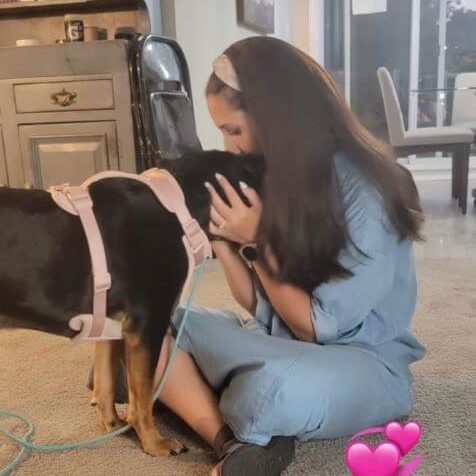
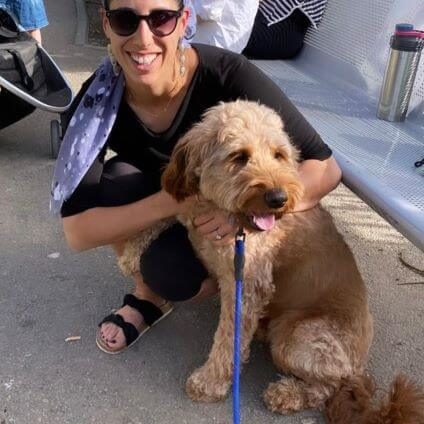
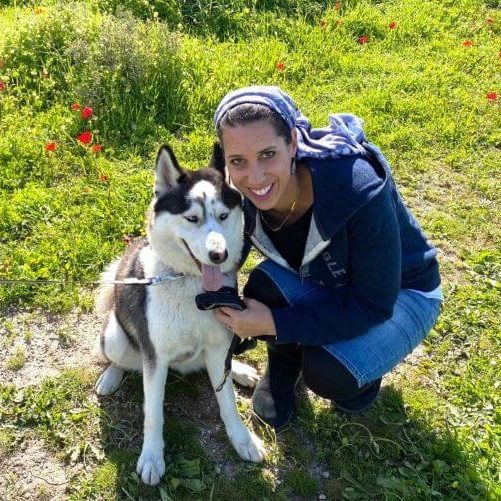
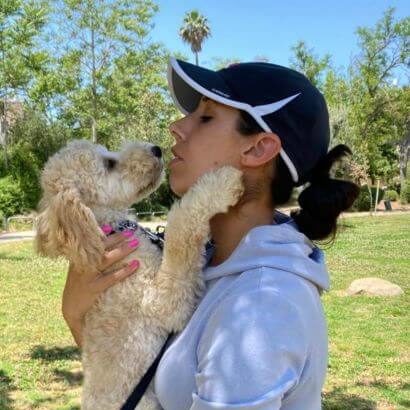
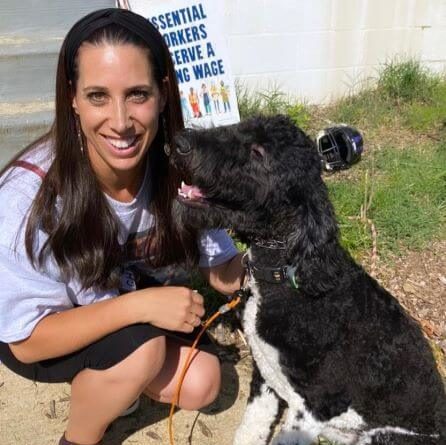
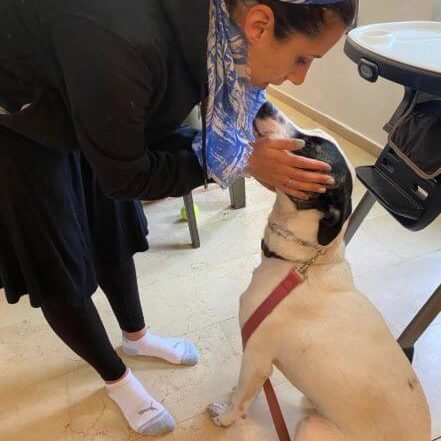
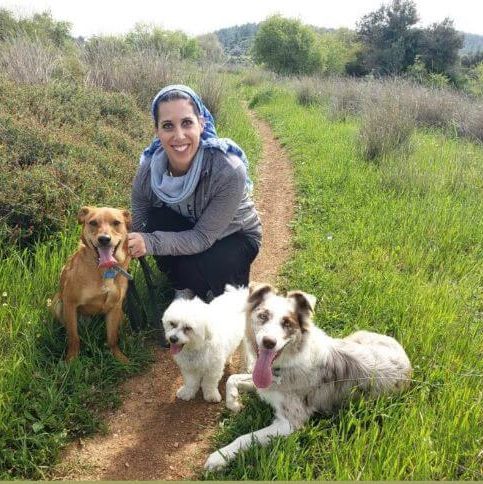





2 comments
Sort by
Sweet article especially highlighting that dogs have been a part of Torah and not just horrifically used during the Holocaust.
Hi, im also an orthodox woman just starting to train dogs. I tried finding Chomie on instagram and facebook but to no success. Is there any way to get in contact with her? I would love to see if i can come with her for a day and learn ❤️